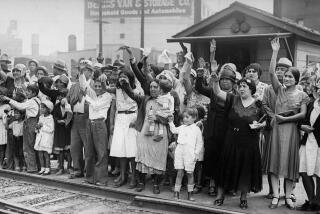U.S. Dismisses Haiti Refugee Complaints : Boat people: Administration finds no evidence of military retribution against those repatriated.
- Share via
WASHINGTON — The Bush Administration insisted Monday that there is no evidence that Haitian refugees being forcibly returned to their country are suffering retribution from the military there, despite reports by United Nations staff members suggesting otherwise.
In separate statements, White House Press Secretary Marlin Fitzwater and State Department spokesman Richard Boucher said that the United States has investigated such claims and has found no evidence to verify them.
“The State Department has checked all those out, and we have not been able to substantiate any of them,” Fitzwater said of the reports by U.N. representatives. “We have no evidence that there is that kind of brutality.”
Also on Monday, attorneys for the Haitian Refugee Center in Miami asked the U.S. Supreme Court to stop the Administration from forcibly repatriating several thousand Haitians and to review the entire program. The refugees are being kept at the U.S. naval base in Guantanamo Bay, Cuba, after they were intercepted at sea.
And the Lawyers Committee for Human Rights wrote to U.S. Atty. Gen. William P. Barr, asking him to suspend the repatriation immediately until U.N. reports “can be fully investigated” and Washington can make assurances that the Haitians “can return in safety and dignity.”
The issue of whether the repatriated Haitians are encountering retaliation is important because, under U.S. immigration law, the Administration must accept the Haitians if there is evidence that they left their country to escape political persecution. But it can turn them away if they left for economic reasons.
The Administration contends that only a few of the more than 15,000 boat people who have fled the strife-torn Caribbean nation since a military coup last Sept. 30 have merited political asylum, and it has sought to return the rest to Haiti.
But groups representing the refugees claim that almost all of the boat people can legitimately claim fear of political persecution. They charged over the weekend that at least 42 refugees had left Haiti for a second time after being returned to their country and encountering new repression.
The lawyers committee made public Monday copies of interviews that representatives of the U.N. refugee agency conducted with repatriated Haitians. The Haitians said they had been pursued by soldiers and that their compatriots had been shot.
In one case, a repatriated refugee said that soldiers arrested his cousin, who had returned on the same Coast Guard cutter, and then came to the refugee’s house looking for him. Later that day, he said, his cousin’s body was found dressed in army clothing and riddled with bullets.
Although a refugee agency spokesman conceded Monday that his panel had no way to check the detailed reports, a U.N. official said that the accounts nevertheless seem disturbing enough “to warrant a review of policy toward the Haitians.”
Spokesmen for the Haitians said they were disappointed by the Administration’s refusal to stop the repatriations. Arthur C. Helton, the director of the panel’s refugee project, called the State Department’s response “quite cursory and dismissive” and “just wrong.”
In Port-au-Prince, U.S. officials said Monday that four cases have been investigated in which it was alleged that Haitians returned in November had been kidnaped or had disappeared, and investigators turned up no evidence to substantiate the claims. One official said that in three of the cases the individuals in question were found, and they denied any harassment. The fourth case is still under investigation, but all indications point to the individual in question being safe.
Roman Catholic Church relief workers in the areas mentioned in the reports of harassment also said they had not been notified by their sources of any unusual problems with returnees.
U.S. officials reported Monday that Coast Guard patrol boats had picked up another 13 Haitian refugees Sunday after encountering none either Friday or Saturday, bringing the total number intercepted since the coup began to 15,388.
Also at issue Monday was a contention by groups representing the Haitian refugees that the U.S. Immigration and Naturalization Service had effectively endorsed the U.N.-obtained interviews by assigning the 42 “double-backers” to a special area for additional interviews.
Although representatives of the Haitian groups contended that the move amounts to recognition that the complaints may be valid, an INS spokesman denied that the agency had taken any such action.
Spokesmen on both sides of the issue said that they do not expect the Supreme Court to rule immediately, although they speculated that the court might act later this week if it intends to stop the repatriation program, even temporarily.
Times staff writers James Gerstenzang, David Savage and Ronald J. Ostrow in Washington, Kenneth Freed in Port-au-Prince and special correspondent Mike Clary in Miami contributed to this report.
More to Read
Sign up for Essential California
The most important California stories and recommendations in your inbox every morning.
You may occasionally receive promotional content from the Los Angeles Times.













